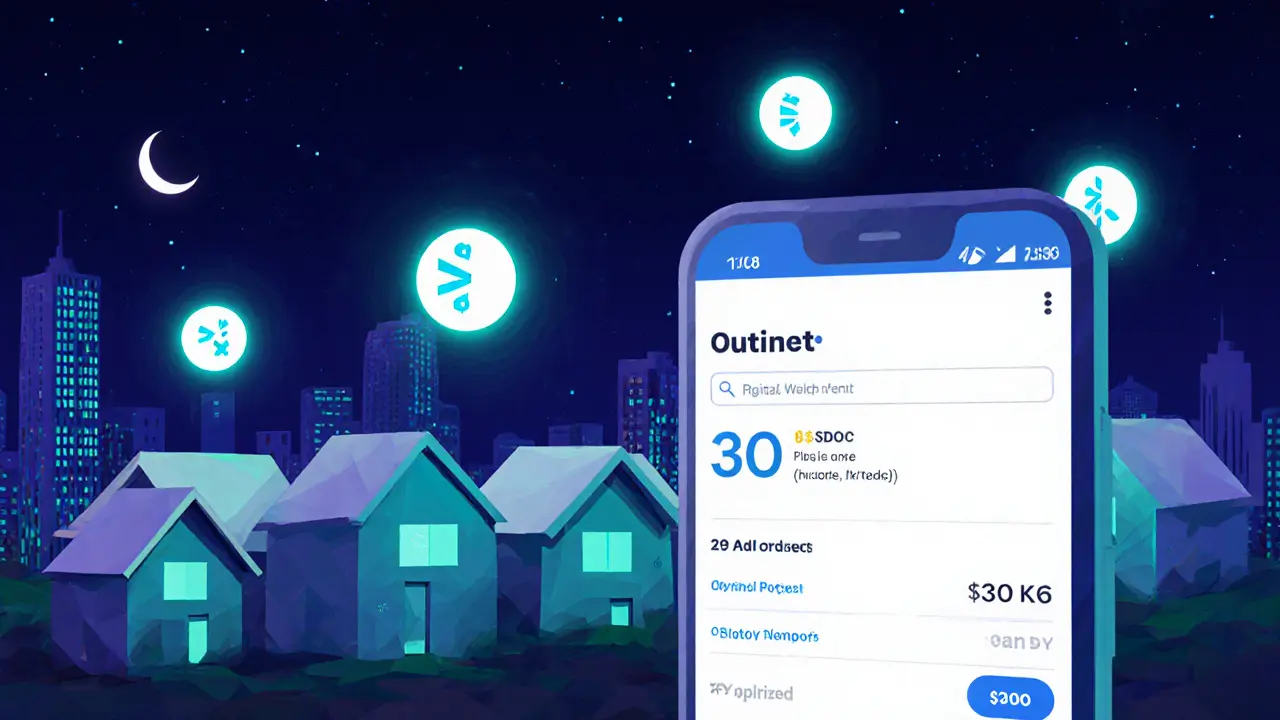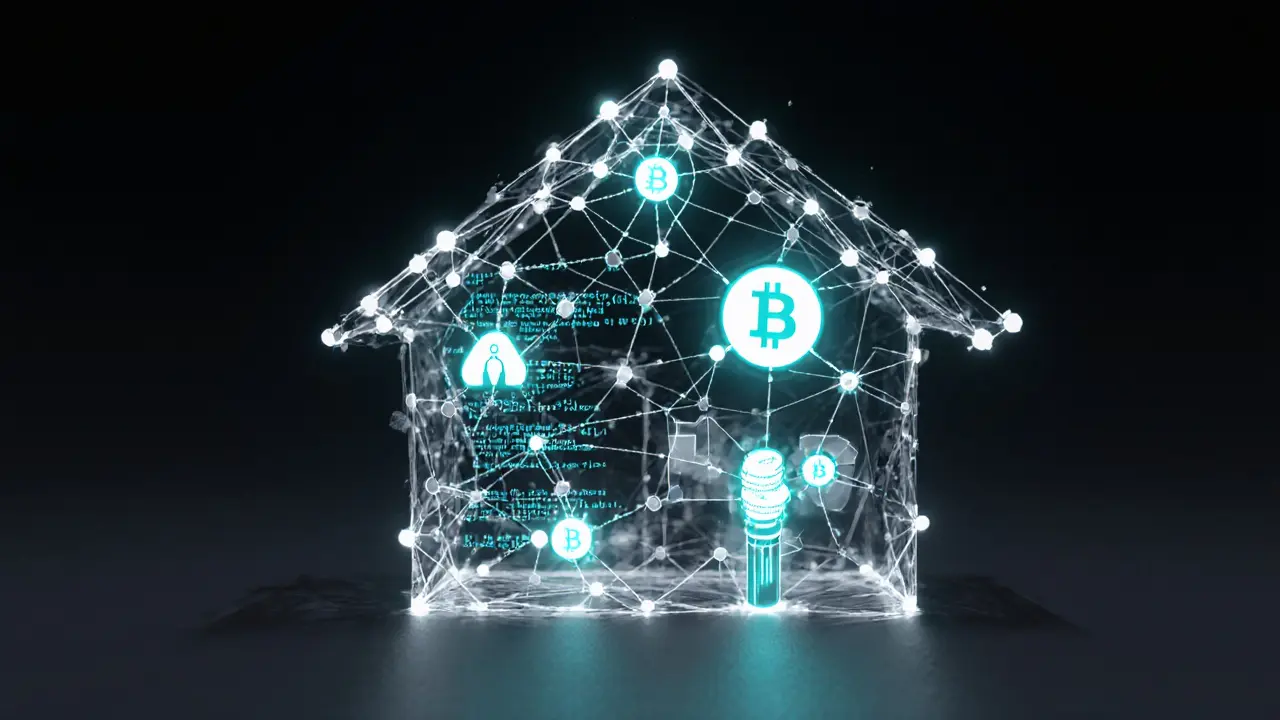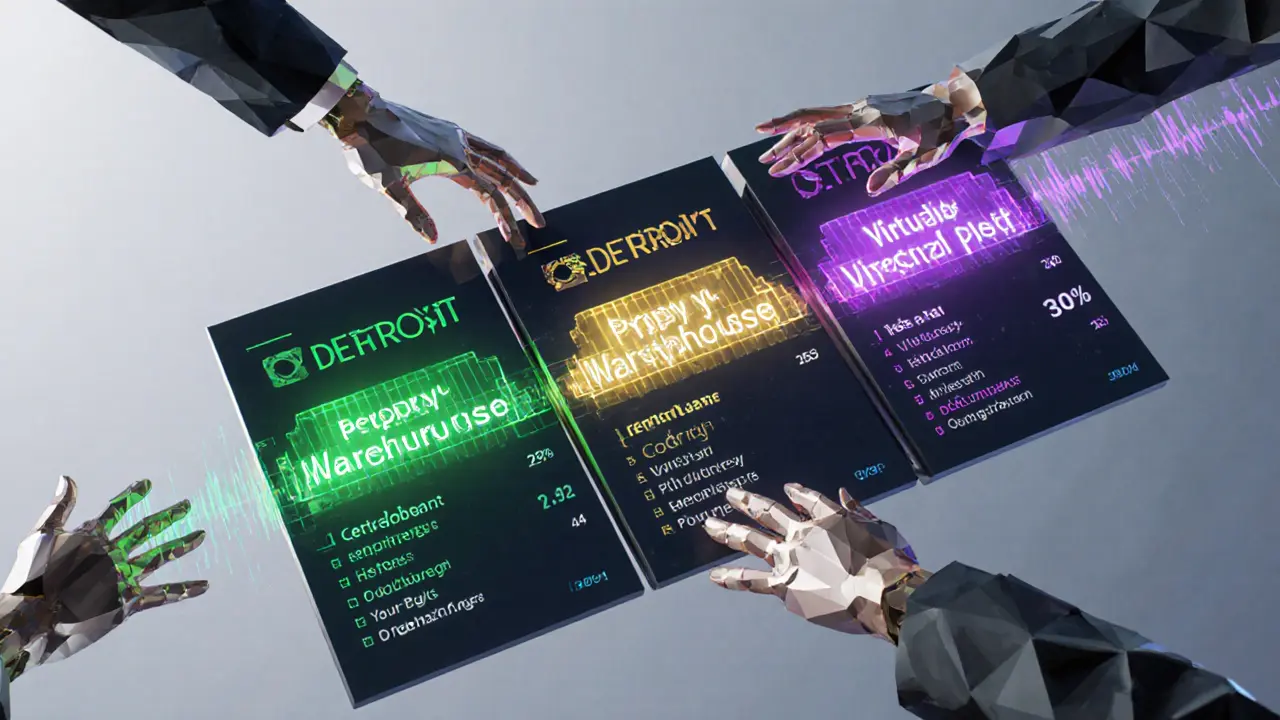Real Estate NFT Platforms and Projects: How Tokenized Property Works in 2025
 Nov, 2 2025
Nov, 2 2025
Real Estate NFT Return Calculator
Estimate Your NFT Investment Returns
Your Estimated Returns
Annual Income:
Monthly Income:
Estimated Yield: 0.0%
Time to Recoup:
* Based on current average rental yields for tokenized properties (e.g., 6-8% annual returns in Detroit, 7-9% in Atlanta) * Actual yields may vary based on market conditions
Imagine buying a piece of a house in Detroit for $300-not the whole house, just a fraction of it-and getting rent payments in crypto every month. That’s not science fiction. It’s happening right now through real estate NFT platforms. These platforms are turning physical homes and commercial buildings into digital tokens on the blockchain, letting anyone, anywhere, invest in real estate without needing a million dollars upfront. For years, owning property was locked behind high barriers: down payments, credit checks, local brokers, and legal red tape. Now, a student in Sydney or a retiree in Lisbon can own a slice of a rental property in Chicago with just a smartphone and a crypto wallet.
How Real Estate NFTs Actually Work
Real estate NFTs aren’t just pictures of houses. They’re digital certificates tied to real-world property, stored on a blockchain like Ethereum. Each NFT represents ownership-either full or fractional-of a physical asset. When a platform like RealT tokenizes a house in Detroit, it doesn’t just make a digital copy. It legally links the NFT to the property’s deed, tax records, and rental income rights. Smart contracts handle everything: rent collection, distribution to owners, and even voting on property repairs or sales.
Here’s how it breaks down:
- A property is selected-usually a single-family home or small commercial building with steady rental income.
- The property is appraised, verified, and legally documented.
- It’s divided into hundreds or thousands of NFT shares, each representing a percentage of ownership.
- These NFTs are listed on a platform where investors can buy them using cryptocurrency.
- Rent payments from tenants are automatically converted to crypto and sent to NFT holders monthly.
No escrow agents. No paper deeds. No waiting weeks for a closing. Everything happens on-chain, transparently. You can see exactly how much rent was collected, who paid it, and how much you earned-all in real time.
Top Real Estate NFT Platforms in 2025
Not all platforms are the same. Some focus on U.S. rentals. Others build virtual properties in metaverses. Here are the five most active and reliable platforms as of late 2025:
RealT
RealT is the oldest and most established player in tokenized U.S. residential real estate. It specializes in single-family homes in cities like Detroit, Atlanta, and Chicago. Investors can buy as little as 0.1% of a property for under $300. Each NFT comes with a legal agreement tied to the actual property deed. Rent is distributed monthly in USDC, a stablecoin pegged to the U.S. dollar, so there’s no crypto volatility risk for income. RealT has tokenized over 200 properties and paid out more than $12 million in rental income since 2020.
Propy
Propy made headlines in 2023 when it completed the first blockchain-based real estate sale of a $1.2 million home in Vermont. Unlike RealT, Propy handles full-property sales, not fractional shares. It’s used by high-net-worth buyers and institutional investors who want to bypass traditional title companies. Propy’s platform integrates with government land registries in several U.S. states and even in Ukraine and the EU. It’s not for beginners-it’s for those looking to buy entire properties with crypto and record ownership permanently on-chain.
Lofty AI
Lofty AI combines real estate NFTs with artificial intelligence. It doesn’t just list properties-it analyzes rental demand, tenant profiles, and market trends to pick the best investments. Its AI picks homes in neighborhoods with rising rental yields and low vacancy rates. Investors then buy NFT shares in these curated properties. Lofty also manages maintenance, tenant screening, and rent collection, so you don’t have to lift a finger. It’s like a robo-landlord powered by machine learning.
Ubitquity
Ubitquity doesn’t sell property. It sells trust. It’s a blockchain-based title and record-keeping platform used by real estate agencies, banks, and government offices. Instead of storing deeds in dusty filing cabinets, Ubitquity records them on a tamper-proof ledger. This reduces fraud, speeds up closings, and cuts costs. While you can’t buy a house directly from Ubitquity, it’s the hidden backbone making other platforms possible. If a platform claims to offer “immutable property records,” it’s likely using Ubitquity’s tech.
Decentraland & The Sandbox
These aren’t for physical property-they’re for virtual land. In Decentraland, you can buy a plot of land in a digital city, build a store or art gallery, and rent it out to other users. These virtual NFTs are traded like stocks. In 2025, some parcels in Decentraland sold for over $100,000. While this isn’t traditional real estate, it’s part of the same trend: turning space into an investable asset. The difference? No zoning laws, no property taxes, and no maintenance costs.
Why Real Estate NFTs Are Changing the Game
Traditional real estate has three big problems: it’s expensive, slow, and local. Real estate NFTs fix all three.
1. Lower Entry Barriers
You don’t need $500,000 to buy a luxury condo in Miami. With RealT, you can own 0.5% of one for $2,500. That’s the same as buying a few shares of Apple stock. This opens up high-value markets to everyday people who were locked out before.
2. Global Access
If you live in Manila and want to invest in U.S. rental property, you used to need a U.S. bank account, a visa, and a lawyer. Now, you just need an internet connection and a MetaMask wallet. Real estate NFTs remove borders.
3. Transparency and Security
Every transaction is recorded on the blockchain. No one can alter the deed. No fake documents. No hidden fees. You can verify ownership anytime, anywhere. This cuts down on fraud, which costs the U.S. real estate industry over $2 billion a year.
4. Automated Income
Rent comes in automatically. No chasing tenants. No late payments. Smart contracts handle it all. If a tenant pays rent, the system splits it among NFT holders within hours.

The Downsides: What No One Tells You
It’s not all smooth sailing. Real estate NFTs come with real risks.
Regulation is a mess
The SEC hasn’t clearly said whether these NFTs are securities. That means if regulations change, your investment could be frozen or reclassified. Some platforms are already working with lawyers to comply, but it’s still a gray area.
Liquidity is low
You can’t sell your NFT share the same day you buy it. There’s no big exchange for real estate NFTs like there is for Bitcoin. You have to wait for someone else to buy it on the platform’s marketplace-and there aren’t always buyers.
You don’t control the property
If the roof leaks, you don’t get to choose the contractor. The platform or its property manager does. You’re a passive investor, not a landlord.
Technical learning curve
You need to understand wallets, private keys, gas fees, and crypto taxes. If you lose your key, you lose your property. There’s no customer service to recover it.
Real People, Real Results
One investor from Melbourne bought $5,000 worth of RealT NFTs in 2023. He owns fractions of four homes in Detroit. Last year, he made $412 in rental income-about 8.2% return, paid monthly in USDC. He didn’t have to deal with tenants, repairs, or property managers. He just watched his balance grow.
Another investor from Berlin used Propy to buy a $900,000 warehouse in Ohio. She paid in ETH, recorded the deed on-chain, and now rents it out to a logistics company. She says the process took 11 days-half the time of a traditional closing.
But not everyone wins. A Reddit user from Toronto bought NFTs on a new platform that shut down in 2024. His tokens became worthless. No refunds. No recourse. That’s the risk with startups.

Who Should Invest in Real Estate NFTs?
Real estate NFTs are perfect for:
- People who want passive income from real estate but can’t afford a full property
- International investors looking to diversify outside their home country
- Those who already use crypto and understand wallets and private keys
- Investors who value transparency and automation over hands-on control
They’re NOT for:
- People who want to flip properties quickly
- Those who don’t understand crypto or are scared of tech
- Anyone expecting guaranteed returns or government-backed insurance
What’s Next? The Future of Tokenized Real Estate
By 2030, experts predict over 25% of commercial real estate transactions will involve blockchain. That’s not a guess-it’s based on current adoption rates. More banks are testing tokenization. Governments in Singapore and Dubai are building blockchain land registries. Even traditional REITs are exploring fractional ownership models.
Platforms are getting easier. Mobile apps now let you buy NFTs with a fingerprint. AI tools predict rental growth before you invest. Some are even integrating with traditional banking systems so you can pay with fiat and get crypto payouts.
But the biggest hurdle isn’t tech-it’s trust. People need to believe that a digital token is as secure as a paper deed. That’s why platforms like Ubitquity and Propy are partnering with real estate lawyers and title insurers. They’re not trying to replace the system. They’re trying to make it better.
If you’re curious, start small. Buy a $100 share on RealT. See how the rent flows in. Learn how the wallet works. Then decide if you want more.
Are real estate NFTs legal?
Yes, but the rules vary by country. In the U.S., platforms like RealT and Propy work with legal teams to ensure compliance with state property laws and securities regulations. However, the SEC hasn’t issued clear rules yet, so there’s regulatory uncertainty. Some countries, like Switzerland and Singapore, have clearer frameworks. Always check local laws before investing.
Can I live in a property I own as an NFT?
Generally, no. Most real estate NFTs are for investment, not occupancy. Platforms like RealT rent out the properties to tenants. You’re a shareholder, not a resident. Some platforms are testing owner-occupancy models, but they’re rare. If you want to live somewhere, buy the property outright through traditional means.
How do I cash out my rental income from real estate NFTs?
Rental income is paid in stablecoins like USDC or DAI, which are pegged to the U.S. dollar. You can hold them in your wallet, trade them for other crypto, or cash them out to your bank account via a crypto exchange like Coinbase or Kraken. Most platforms support direct transfers to exchanges, making it easy to convert to fiat.
What happens if the platform shuts down?
Your NFTs are stored on the blockchain, not on the platform’s servers. Even if RealT or Lofty AI goes offline, your tokens still exist. You can still view ownership records on Ethereum block explorers. But you’ll lose access to their apps, rent distribution tools, and customer support. That’s why it’s safer to use established platforms with a long track record.
Do I pay taxes on real estate NFT income?
Yes. In most countries, rental income from NFTs is taxed as ordinary income. Capital gains apply if you sell your NFT for a profit. Crypto tax software like Koinly or TokenTax can track your transactions. Always consult a tax professional familiar with blockchain assets-rules vary by country and are changing fast.

